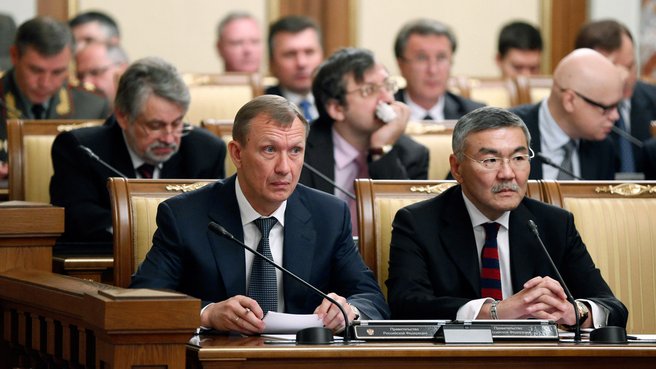Agenda: Preliminary results of the 2013 harvest and 2014 preparatory field work, the draft federal targeted programme Agricultural Land Reclamation in 2014-2020, and 17 other issues
Opening remarks by Dmitry Medvedev:
Good afternoon. Our agenda today is fairly extensive. Traditionally for the autumn, the first item includes tentative estimates of this year’s harvest and preparing the farmland for future crops.
The field work is nearing completion. Wheat, other grains and legumes have been harvested on almost 83% of the area. The average yield is higher than last year at about 22 centners per hectare as compared with 18.5 centners in 2012. That’s not bad at all. The wheat yield is also very good at about 24 centners per hectare.
Gross grain harvest figures are also 13 million tonnes higher than in 2012. We plan to harvest 90 million tonnes this year. This is still a good number, although it’s somewhat less than originally forecasted by the Ministry of Agriculture. We are all aware of the reasons: the drought in the Volga Region and the Urals and heavy rainfall and flooding in the Far East. Still, things turned out pretty well for us.
I’d be remiss not to mention the importance of agricultural insurance contracts supported by the government. According to the insurers, about 4,000 agricultural enterprises have signed such contracts as of September 1. However, the total area of insured farmland is only 11 % of the total area. That’s more than before, but still not nearly enough. This work has to continue.
Plans are in place to plant nearly 16.4 million hectares of winter crops for the 2014 harvest. The actual numbers will, of course, depend on the weather conditions. Unfortunately, we are a bit late with sowing in certain parts of the Volga and Central federal districts because of September rains, so the final plans for the winter crops will have to be adjusted. To date, about 9 million hectares of farmland have been planted. This is less than last year, so it’s imperative that the regions where the time of winter crops sowing is over focus on increasing spring sowing areas for the main crops. I’m talking about wheat, corn, and soybeans. The federal budget has 63 billion roubles in subsidies allocated for supporting crop production.
With regard to government commodity market interventions, the latest proposal is to conduct them outside of commodity exchanges and provide farmers with an option to repurchase grain from the Federal Intervention Fund. If the situation on the market changes, we will be able to get a better price for our grain. Meanwhile, the farmers will get an opportunity to take advantage of the working capital and, therefore, to obtain the necessary income.
Today, we will also look into the draft federal targeted programme Agricultural Land Reclamation to 2020. This is an important issue. Currently, we have only 8% of farmland under reclamation. This is plainly not enough, although almost 8% of farmland provides us with half of our vegetables, 20% of feed and the entire rice crop.
Unfortunately, our reclamation system is in ruins. No substantial investments went there following the collapse of the Soviet Union, and it has steadily degraded. The draft federal programme is designed to address these issues by increasing the area of reclaimed land by 840 hectares. As a result, the crop production should increase by almost one third and the number of jobs will increase by almost 100,000.
The programme provides for streamlining the ownership structure and developing infrastructure property accounting systems. Total funding for the programme amounts to 185 billion roubles, of which 40% are funded from the federal budget, 25% from regional budgets, and about 35% from extrabudgetary sources.
Today, we’ll also look into the changes in the 2013 budget and the 2014-2015 planning period. We’ll be talking about the redistribution of saved funds. We will use this money to address important regional issues. Providing relief to flooded areas in the Far East in the amount of about 40 billion roubles is one of them. A significant amount will go to balance regional budgets. It will also be used to finance housing construction for military personnel, provide medical equipment to people with disabilities and address some other socially important issues.
A draft Government directive on the Russian Far East was developed today. It applies to families with pre-school children and children with disabilities, the elderly, and people with health restrictions. We do a lot to build new homes and renovate damaged ones, but there’s too much work due to the scale of the disaster. We cannot take risks, because the winter is coming and the flood is not over yet. This is the main problem. Therefore, provisions have been made to accommodate people in holiday hotels, guesthouses, health resorts and other social service facilities within and beyond the affected areas.
Plans are in place to provide subsidies in the amount of 600 million roubles to the most affected areas, such as the Khabarovsk Territory, the Amur Region, and the Jewish Autonomous Region. Over 3 billion roubles will be used to partly compensate people for the loss of property.
Also included here is the issue of granting subsidies to agricultural producers for the recovery of lost crops. Almost 900 million roubles will go to this end. It is planned to allocate subsidies for agrotechnical work, land reclamation and crop recovery. In addition, there will be interest rate refunds on loans to expand crop and livestock production and product processing and sales. This portion of the refund is also included in this resolution. That's almost 400 million roubles.
<…>














